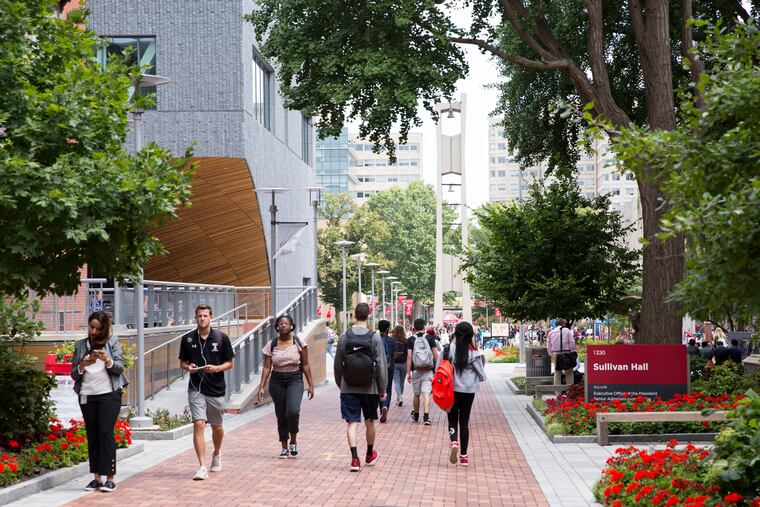U.S. colleges brace for a devastating summer and fall
For many U.S. colleges, the worst may still be ahead.The upheaval in higher education has been unprecedented already, with campuses closed for months, graduation ceremonies scrapped and entrance exams canceled.

For many U.S. colleges, the worst may still be ahead.
The upheaval in higher education has been unprecedented already, with campuses closed for months, graduation ceremonies scrapped and entrance exams canceled. Administrators across the nation increasingly fear their schools may not reopen for the fall semester. In the meantime, many have canceled summer programs, sports camps and on-campus weddings — all of which would be lucrative most years. The double whammy of losing summer and fall income would hurt all schools, and it could be fatal to those that were already struggling.
"The hit is huge," said Larry Ladd, a consultant with the Association of Governing Boards of Universities and Colleges. "They will have less financial cushion because that summer revenue is no longer is there."
College finances are under siege on many fronts. Endowment values have fallen with markets. Fund-raising is a steep challenge now. New and returning students may have increased need for financial aid, because many families have lost income in the COVID-19 downturn. Some colleges even fear they won't be able to fill their freshman class for fall 2020 as students may decide to wait a year instead of starting online, which would strangle tuition revenue.
High school counselors are advising students that planning ahead even as far as September will be difficult.
"I would tell kids: No. 1, the likelihood of having face-to-face classes in September is pretty darn small," said Scott White, a retired guidance director for more than 20 years at Montclair High School in New Jersey. Referring to COVID-19's risk to older people, he said: "You're not going to get 65-year-old college professors going in."
Northwestern University is still making that tough call. "Our return to on-campus instruction in the summer or fall quarters is also not guaranteed," the school's president, Morton Schapiro, wrote in a letter Thursday. He said the decision to refund room-and-board payments and student fees for the spring had cost more than $25 million, and the school is facing more losses from endowment declines, increased financial aid and the cancellation of some on-campus programs.
» FAQ: Your coronavirus questions, answered
While Northwestern hasn't yet decided whether to cancel summer activities including its nearly 90-year-old high school summer offering, known as the Cherub program, other schools are already clearing their summer calendars of the programs that typically bring thousands of high school students to campus.
Cornell University's on-campus programs slated to start before July 12 have been cut or will be converted to online offerings. Brown University canceled its residential precollege programs for the first half of the summer and in mid-May expects to provide an update for those taking place from July 12 to Aug. 7. Brown's summer high school program, undergrad session and sports camp last year brought in $30 million, about 3% of its operating revenue, the school said.
The estimated lost revenue from summer camps, conferences and rentals at the University of Illinois at Urbana-Champaign is about $4.6 million, said spokeswoman Robin Kaler. The school for now has canceled all events through May 17 and all camps through July 10.
Some smaller schools have higher stakes. Instead of letting dorms sit empty each summer, Skidmore College in Saratoga Springs, New York, usually hosts paying guests like conference attendees and prospective students. Summer programs including the Skidmore Jazz Institute and the New York State Writers Institute typically enroll more than 2,200 students each summer and attract over 13,000 audience members. This year all on-campus activities from May 31 to Aug. 23 are canceled — a loss of about $2 million in net revenue. “While this may be considered a modest loss at some institutions,” said spokeswoman Sara Miga, “it is significant to Skidmore.”
Officials at two Pennsylvania colleges, Dickinson and Franklin & Marshall, said the schools would lose revenue this summer if they can't continue to host programs such as the Johns Hopkins Center for Talented Youth; Skidmore is also a host site.
Franklin & Marshall's bigger worry is that international students might not be able to attend in the fall; they usually make up 20% of each class, the school said. At Michigan State, President Samuel Stanley said in a letter Thursday that the school has "promising news in our applications and deposits, which remain near last year's levels," but he said international student enrollment is likely to suffer.
Summer programs may be money makers, said White, the college counselor, “but empty dorms is what kills colleges.”